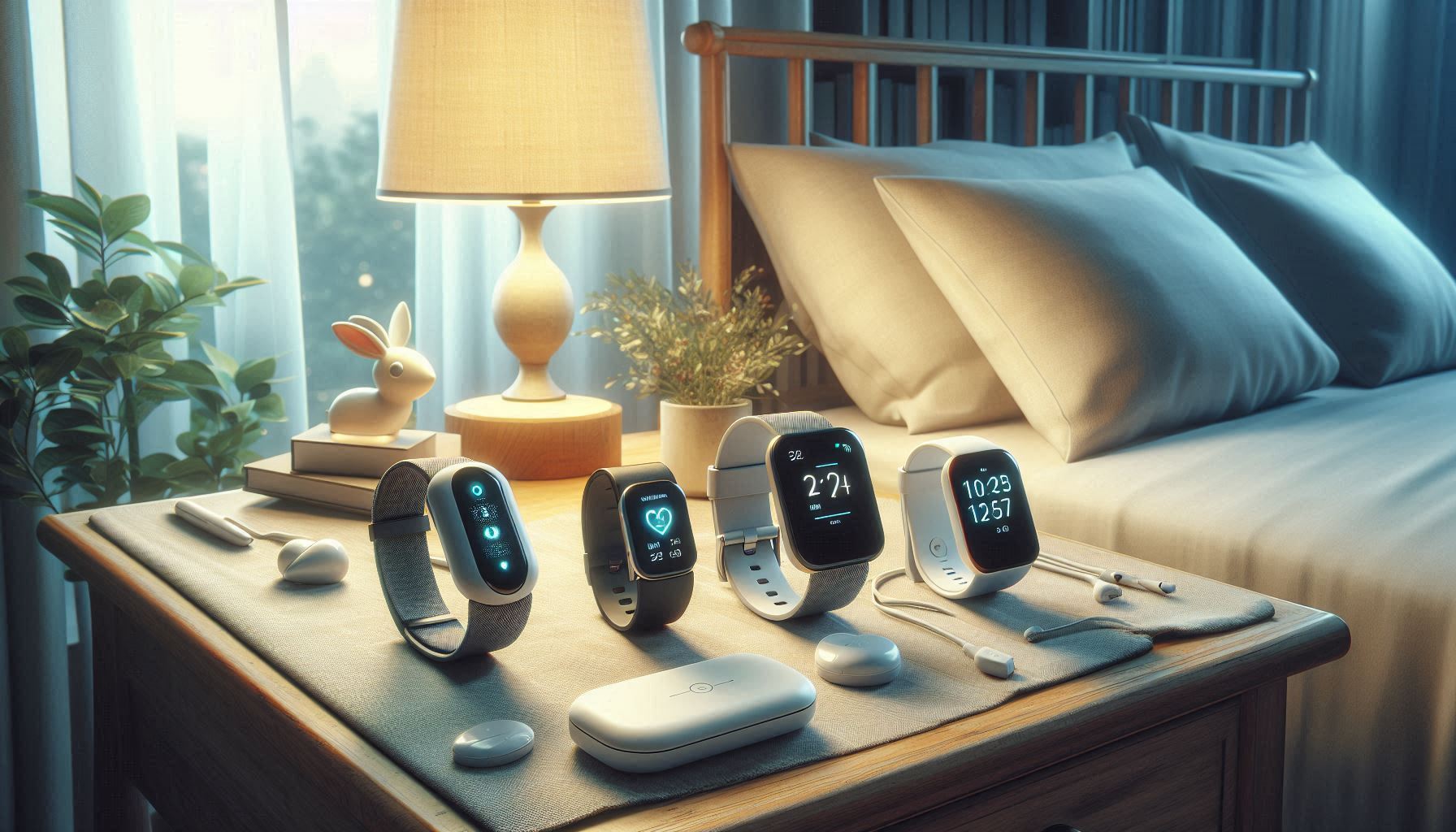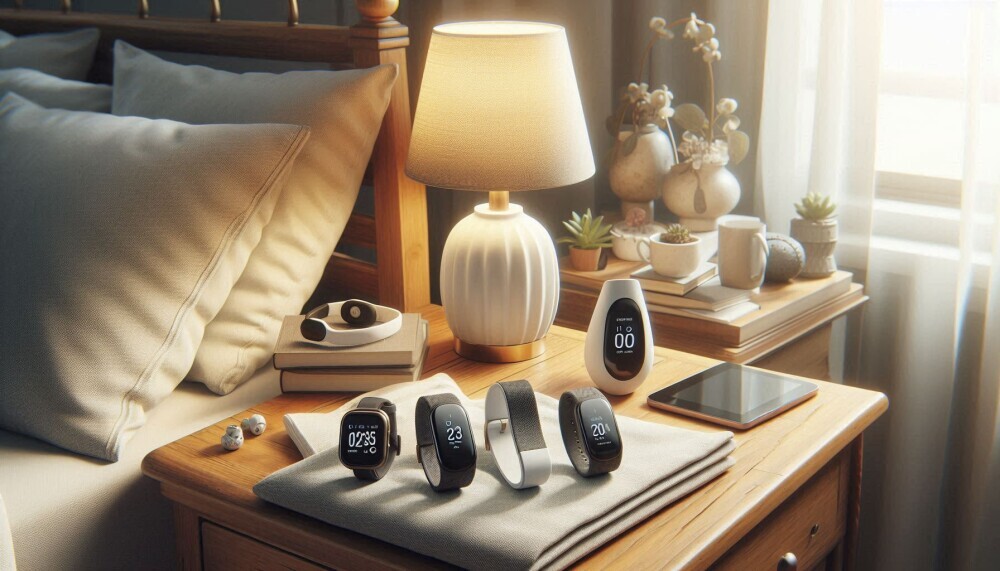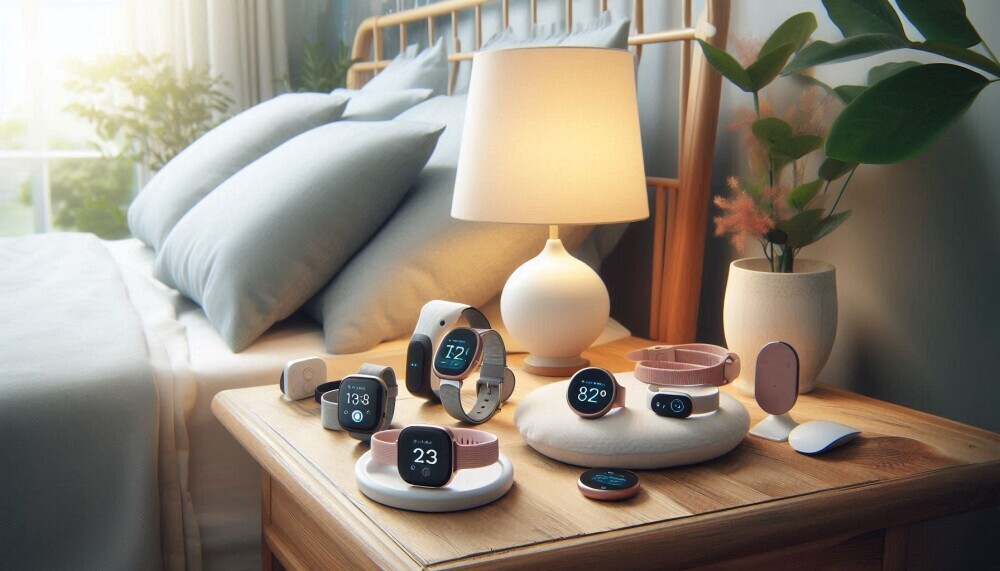Millions of people suffer from various sleep disorders. Sleep apnoea is among those and can cause major problems in a sufferer’s life. Let’s take a look at the Best 6 Wearables For Sleep Apnoea.
Introduction
Sleep apnoea is a serious yet often overlooked condition that affects millions of people around the world. Characterised by repeated interruptions in breathing during sleep, this disorder can lead to fatigue, poor concentration, headaches, cardiovascular problems, and an overall decrease in quality of life.
Traditionally, sleep apnoea has been diagnosed using in lab sleep studies known as polysomnography, which are accurate but expensive and inconvenient. Thankfully, advances in wearable technology have opened up new opportunities for tracking sleep disturbances, offering individuals a way to monitor their health from the comfort of their own home.
Wearable devices have evolved to become surprisingly capable in detecting patterns associated with sleep apnoea such as heart rate variability, blood oxygen saturation, movement, and even respiratory rate. Whether you are already diagnosed and want to track your condition more closely or you are concerned about undiagnosed symptoms, certain wearables can help identify warning signs and patterns that point to potential sleep disordered breathing.
In this article, we will explore the best six wearables for sleep apnoea, breaking down their key features, accuracy, pricing, benefits, and limitations. The goal is to help you choose the one that best suits your needs, lifestyle, and budget.
1. Withings Sleep Analyzer
Key Features:
The Withings Sleep Analyzer is a non wearable sleep mat placed under the mattress. It detects sleep cycles, heart rate, snoring patterns, and breathing disturbances that could indicate sleep apnoea. It offers medical grade analysis and provides a detailed sleep report every morning through the app.
Price: Around £150
Pros:
- Clinically validated for detecting sleep apnoea
- Comfortable and contactless
- Snoring detection and respiratory event index included
- Easy integration with Apple Health and Google Fit
Cons:
- Cannot be used away from home
- No live alerts for apnoea events
Best for: Individuals who prefer non intrusive monitoring and want a medical grade analysis of potential sleep apnoea.
2. Fitbit Sense 2
Key Features:
The Fitbit Sense 2 is a full feature smartwatch that includes overnight SpO2 tracking, heart rate variability, skin temperature monitoring, and breathing rate. These metrics can help identify sleep disturbances linked to apnoea.
Price: Around £200
Pros:
- Tracks blood oxygen levels throughout the night
- Long battery life
- Attractive design with stress and wellness tracking
- Excellent sleep stage detection
Cons:
- Not a medical device
- SpO2 readings may vary in accuracy
Best for: Users looking for a feature packed smartwatch that tracks multiple health metrics beyond just sleep apnoea indicators.
3. Oura Ring Gen 3
Key Features:
The Oura Ring Gen 3 is a sleek smart ring that provides detailed analysis of heart rate, breathing rate, temperature, movement, and blood oxygen saturation. Its latest models support SpO2 tracking and detect signs of sleep disruption.
Price: Around £300 plus monthly subscription fee of around £5
Pros:
- Extremely comfortable and discreet
- Advanced sleep analysis including REM and deep sleep
- Consistent tracking of respiration and body temperature
- Long battery life of five to seven days
Cons:
- Small display less device requires app for viewing data
- Subscription required for most features
Best for: Those who want a minimalist non wrist wearable that still delivers powerful sleep and respiratory insights.
4. Garmin Vivosmart 5
Key Features:
Garmin Vivosmart 5 includes pulse oximetry, respiration tracking, and sleep stage monitoring. It is affordable and tracks SpO2 trends overnight, which is helpful in spotting low oxygen levels that could relate to apnoea events.
Price: Around £130
Pros:
- Lightweight and affordable
- Tracks blood oxygen and breathing patterns
- Connects with Garmin Connect app for detailed graphs
- Good battery life of up to seven days
Cons:
- Small screen
- Does not give direct diagnosis or warning for apnoea
Best for: Budget conscious users looking for basic respiratory and oxygen saturation monitoring.
5. Apple Watch Series 9
Key Features:
Apple Watch Series 9 features a powerful set of health sensors including continuous heart rate tracking, overnight SpO2, respiratory rate, and sleep stage detection. Although it is not officially approved for sleep apnoea detection, the available data can highlight potential issues.
Price: Around £400
Pros:
- Highly accurate health sensors
- Full ecosystem of health apps
- Syncs with third party sleep apnoea trackers
- Sleek design and high build quality
Cons:
- Expensive
- Shorter battery life may require daily charging
Best for: Users already invested in the Apple ecosystem who want advanced health tracking including overnight SpO2 trends.
6. Wellue O2Ring Continuous Ring Oxygen Monitor
Key Features:
The Wellue O2Ring is designed specifically to monitor oxygen saturation and heart rate continuously throughout the night. It vibrates to alert you during oxygen drops and stores detailed trend data.
Price: Around £200
Pros:
- Clinically oriented tracking
- Continuous oxygen and pulse monitoring
- Vibrates to warn user of oxygen dips
- Great for ongoing monitoring of diagnosed apnoea
Cons:
- Focused only on oxygen and heart rate
- Less lifestyle focused than smartwatches
Best for: Users diagnosed with sleep apnoea or those with low oxygen concerns who need targeted night time oxygen monitoring.
Comparison Summary
Among the six wearables reviewed, each offers a unique benefit depending on your needs. The Withings Sleep Analyzer is the most clinical and passive option, ideal for users who prefer not to wear anything. Fitbit Sense 2 and Apple Watch Series 9 offer powerful all-around smart features with decent respiratory tracking. Oura Ring excels in comfort and recovery insights, while Garmin Vivosmart 5 provides a good entry-level wearable. Finally, the Wellue O2Ring is specialised for oxygen tracking and is particularly suitable for diagnosed apnoea patients. Ultimately, your choice will depend on your budget, comfort preference, and whether you want general wellness data or targeted apnoea alerts.
Frequently Asked Questions
1. Can a wearable actually diagnose sleep apnoea?
No, wearables cannot officially diagnose sleep apnoea. However, they can identify patterns such as low oxygen levels, irregular breathing, and poor sleep quality that suggest the possibility of sleep apnoea. Diagnosis must be made by a healthcare professional through a sleep study.
2. Which wearable is best for someone already diagnosed with sleep apnoea?
The Wellue O2Ring is the most effective for someone already diagnosed because it provides real time oxygen saturation alerts and continuous night time data. It is medically oriented and helpful for tracking treatment effectiveness.
3. Are wrist-based trackers as accurate as under-mattress devices?
Not always. Devices like the Withings Sleep Analyzer may provide more reliable data because they avoid motion noise and track respiration more consistently. However, wrist based trackers are more portable and offer broader health features.
4. Do these wearables work with CPAP machines?
Most wearables do not directly integrate with CPAP machines, but you can use them in parallel to assess sleep quality and effectiveness of treatment. Some third party apps may allow syncing between devices for more comprehensive tracking.
5. What does low SpO2 mean during sleep?
Low SpO2 or blood oxygen levels during sleep may indicate obstructed breathing, which is a hallmark of sleep apnoea. If your wearable shows consistent oxygen drops below ninety percent, it may be a sign to consult a sleep specialist.
6. Is it worth subscribing to Oura’s membership?
Yes, if you are serious about tracking sleep apnoea indicators and recovery. The membership unlocks full features including SpO2 trends, sleep stage breakdown, and readiness scores. Casual users may prefer alternatives without ongoing fees.
Conclusion
Choosing the right wearable for sleep apnoea monitoring depends largely on your personal needs. If you value comfort and subtlety, the Oura Ring might be your ideal match. If you are already using an Apple or Android phone and want an all purpose smartwatch, the Apple Watch or Fitbit Sense offer great value. Those seeking targeted night time oxygen tracking will benefit most from the Wellue O2Ring or Withings Sleep Analyzer, both of which deliver medical grade accuracy in respiratory insights.
As technology continues to evolve, these wearables are playing a growing role in helping people become more aware of their sleep patterns and overall well being. While none of them replace formal diagnosis, they empower users with data and early insights that can lead to life changing interventions. If you suspect you are experiencing disrupted sleep, excessive snoring, or daytime fatigue, one of these wearables could be a valuable first step in understanding what is happening while you sleep.
Our Thanks!
Many thanks for taking the time to read this article on the Best 6 Wearables For Sleep Apnoea. Hopefully, it has helped you with your search for a suitable sleep apnoea wearable. If you would like some more reading, take a look at our blog! You might like our related article which is titled The Best 5 Sleep Monitoring Devices.
Please let us know in the comments which brand and type of sleep monitoring device you are currently using or plan to buy in the future!
**Here is a bit of transparency. Our website www.vertevia.com does contain affiliate links and Amazon links. So, if you did make a purchase through the website, we may receive a small commission. This is at no extra cost to you whatsoever. It’s just a way for you to support us as we continue to bring you top quality content**
All the best!
Eamon





